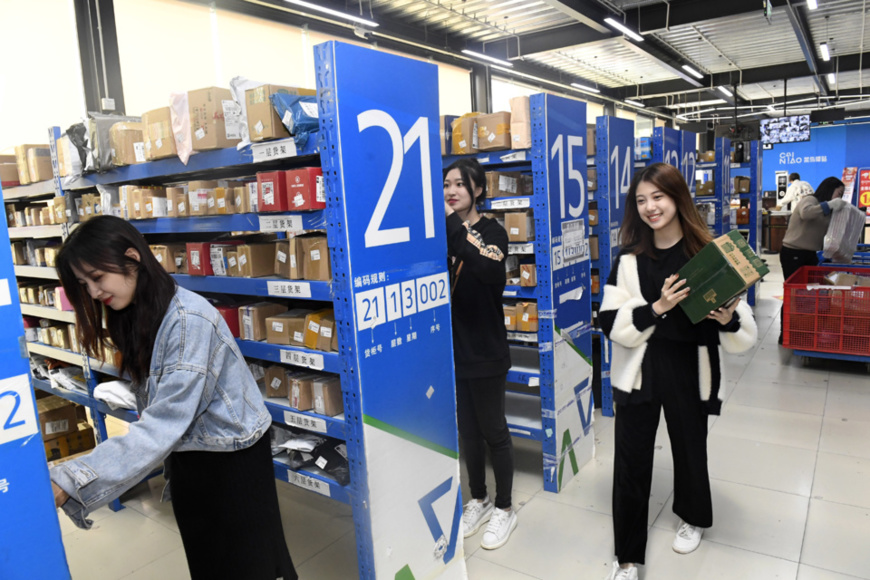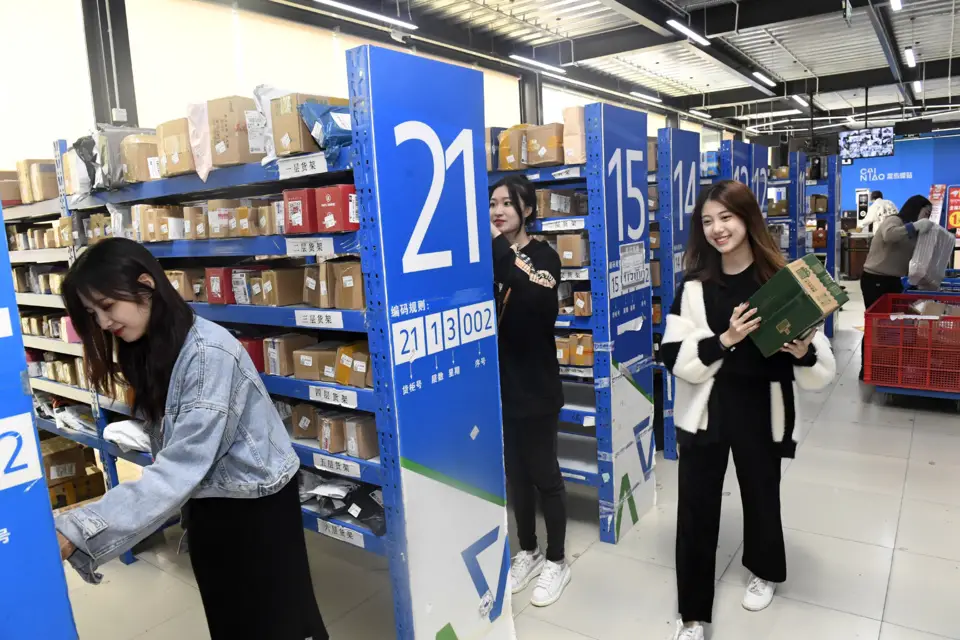By Wang Ke, Luo Shanshan, People’s Daily

A parcel pickup station in a university in southwest China’s Sichuan province is well prepared for the peak time of the “Double 11” online shopping festival by simplifying pickup procedures for students. (Photo by Li Xiangyu/People’s Daily Online)
China’s annual shopping festival, known as “Double 11” as it falls on Nov.11, warmed up already beginning 00: 00 on Nov.1. Transaction data from the country’s major retail platforms show that from Nov.1 to 11, the volume of online and offline sales for China’s retail market reached a new high.
Apart from enthusiastic buyers and sellers, this year’s event was characterized by high demand for merchandise symbolizing consumption upgrading, the rapid growth of service consumption, and customized consumption that drives the upgrade of brands’ supply chains, which vividly signaled accelerated consumption recovery in China’s retail market.
E-commerce giant JD.com reported that mainstream brands of 3C products (computers, communications and consumer electronics), including Haier, Midea, Gree, and Huawei, traded over 100 million yuan ($14.96 million) within seconds, respectively.
From 00:00 to 10:00 a.m. on Nov. 11, the overall turnover of refrigerators and washing machines exceeded that of the whole day last year.
The turnover of Xiaomi mobile phones increased by more than 3 times year on year, and that of Huawei and Samsung mobile phones grew by 120 percent year on year on the platform.
Over 100,000 computers were sold within the first three minutes on the same day on the platform, while the turnover of high-end RTX graphics cards increased by 6 times year on year in the first 10 minutes.
The sales of imported goods saw rapid growth on Tmall, Alibaba’s third-party platform for brands and retailers. Over 2,600 overseas brands participated in this year's “Double 11” shopping festival for the first time on Tmall Global, bringing 1.2 million new products.
From 0:00 on Nov.1 to noon on Nov. 11, the turnover of imported goods increased by 47.3 percent year on year on Tmall Global. During the period, 180 overseas brands generated a turnover of over 10 million yuan and 816 international brands traded over one million yuan.
Smart home appliances have become a new favorite among consumers on another Chinese e-commerce giant Suning.com.
Aesthetically pleasing electrical appliances with upgraded functions and high technology and smart kitchen appliances sold well on the platform. Products such as floor scrubbers, hand blenders, capsule coffee machines, mini rice cookers, and mini blenders were immensely popular with Chinese consumers.
The sales of emerging smart home appliance brands such as Morphy Richards from the United Kingdom, as well as domestic brands Narwal and Tineco also grew rapidly.
The shopping festival also stimulated the recovery of the tourism industry. On Nov. 1, Universal Beijing Resort’s newly launched flagship store on Fliggy, Alibaba’s online travel service provider, sold 10,000 priority ticketing quotas, which allow ticket holders to book tickets in advance than other visitors, in just 9 seconds after its launch.
Consumers rushed to purchase over 80,000 ticket discount packages under the banner of “fly at will” rolled out by domestic airlines.
Middle and high-end short-distance vacations mainly launched for China’s three major economic centers—the Yangtze River Delta, the Guangdong-Hong Kong-Macao Greater Bay Area and the Beijing-Tianjin-Hebei region, have also been warmly received.
After years of integrated development, “Double 11” has become a festival for both online and offline promotional sales. During this year's event, e-commerce platforms accelerated the integration of offline stores, which also proactively embraced digitalization, creating a better shopping experience for consumers and stimulating greater potential in the consumer market.
Data from Tmall show that the platform saw a record peak of 583,000 orders per second at 00: 26 on Nov. 11. From 00: 00 on Nov. 1 to 24:00 on Nov. 11, the platform’s turnover exceeded 498.2 billion yuan.
According to data released by JD.com, the cumulative amount of orders placed on the platform exceeded 271.5 billion yuan during the 11-day period, again setting a new record.
During this year’s shopping festival, Intime Department Store, China’s leading department-store chain, hosted nearly 100 offline carnivals so that users could enjoy a comprehensive high-quality consumption experience involving eating, drinking and entertainment.
Besides, 4,740 shopping guides from Intime participated in more than 4,000 live-streaming sessions. From Nov. 1 to 9, sales of the company’s 15 online stores were 2.5 times that in the same period last year.
Chinese consumers embarked on a new round of spending spree during the “Double 11” shopping festival. The accelerated integration of online and offline retail has continuously energized the consumption market.
With enhanced supply-demand relations, digitization has become an important force driving the intelligent transformation of industrial chains, boosting the transformation and upgrading of the real economy.
The “Double 11” shopping festival is a window to observe the business ecosystem such as new consumption and new business models, said Chen Duan from the Central University of Finance and Economics.
From the perspective of the supply side, more and more merchants have accelerated their digital transformation in the process of participating in the event, thus improving consumers’ shopping experience and making greater contributions to the continued improvement of the consumer market.
Apart from enthusiastic buyers and sellers, this year’s event was characterized by high demand for merchandise symbolizing consumption upgrading, the rapid growth of service consumption, and customized consumption that drives the upgrade of brands’ supply chains, which vividly signaled accelerated consumption recovery in China’s retail market.
E-commerce giant JD.com reported that mainstream brands of 3C products (computers, communications and consumer electronics), including Haier, Midea, Gree, and Huawei, traded over 100 million yuan ($14.96 million) within seconds, respectively.
From 00:00 to 10:00 a.m. on Nov. 11, the overall turnover of refrigerators and washing machines exceeded that of the whole day last year.
The turnover of Xiaomi mobile phones increased by more than 3 times year on year, and that of Huawei and Samsung mobile phones grew by 120 percent year on year on the platform.
Over 100,000 computers were sold within the first three minutes on the same day on the platform, while the turnover of high-end RTX graphics cards increased by 6 times year on year in the first 10 minutes.
The sales of imported goods saw rapid growth on Tmall, Alibaba’s third-party platform for brands and retailers. Over 2,600 overseas brands participated in this year's “Double 11” shopping festival for the first time on Tmall Global, bringing 1.2 million new products.
From 0:00 on Nov.1 to noon on Nov. 11, the turnover of imported goods increased by 47.3 percent year on year on Tmall Global. During the period, 180 overseas brands generated a turnover of over 10 million yuan and 816 international brands traded over one million yuan.
Smart home appliances have become a new favorite among consumers on another Chinese e-commerce giant Suning.com.
Aesthetically pleasing electrical appliances with upgraded functions and high technology and smart kitchen appliances sold well on the platform. Products such as floor scrubbers, hand blenders, capsule coffee machines, mini rice cookers, and mini blenders were immensely popular with Chinese consumers.
The sales of emerging smart home appliance brands such as Morphy Richards from the United Kingdom, as well as domestic brands Narwal and Tineco also grew rapidly.
The shopping festival also stimulated the recovery of the tourism industry. On Nov. 1, Universal Beijing Resort’s newly launched flagship store on Fliggy, Alibaba’s online travel service provider, sold 10,000 priority ticketing quotas, which allow ticket holders to book tickets in advance than other visitors, in just 9 seconds after its launch.
Consumers rushed to purchase over 80,000 ticket discount packages under the banner of “fly at will” rolled out by domestic airlines.
Middle and high-end short-distance vacations mainly launched for China’s three major economic centers—the Yangtze River Delta, the Guangdong-Hong Kong-Macao Greater Bay Area and the Beijing-Tianjin-Hebei region, have also been warmly received.
After years of integrated development, “Double 11” has become a festival for both online and offline promotional sales. During this year's event, e-commerce platforms accelerated the integration of offline stores, which also proactively embraced digitalization, creating a better shopping experience for consumers and stimulating greater potential in the consumer market.
Data from Tmall show that the platform saw a record peak of 583,000 orders per second at 00: 26 on Nov. 11. From 00: 00 on Nov. 1 to 24:00 on Nov. 11, the platform’s turnover exceeded 498.2 billion yuan.
According to data released by JD.com, the cumulative amount of orders placed on the platform exceeded 271.5 billion yuan during the 11-day period, again setting a new record.
During this year’s shopping festival, Intime Department Store, China’s leading department-store chain, hosted nearly 100 offline carnivals so that users could enjoy a comprehensive high-quality consumption experience involving eating, drinking and entertainment.
Besides, 4,740 shopping guides from Intime participated in more than 4,000 live-streaming sessions. From Nov. 1 to 9, sales of the company’s 15 online stores were 2.5 times that in the same period last year.
Chinese consumers embarked on a new round of spending spree during the “Double 11” shopping festival. The accelerated integration of online and offline retail has continuously energized the consumption market.
With enhanced supply-demand relations, digitization has become an important force driving the intelligent transformation of industrial chains, boosting the transformation and upgrading of the real economy.
The “Double 11” shopping festival is a window to observe the business ecosystem such as new consumption and new business models, said Chen Duan from the Central University of Finance and Economics.
From the perspective of the supply side, more and more merchants have accelerated their digital transformation in the process of participating in the event, thus improving consumers’ shopping experience and making greater contributions to the continued improvement of the consumer market.
 Menu
Menu
 “Double 11” shopping festival shows accelerated consumption recovery in China
“Double 11” shopping festival shows accelerated consumption recovery in China
















